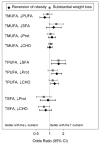Quality of Dietary Fat Intake and Body Weight and Obesity in a Mediterranean Population: Secondary Analyses within the PREDIMED Trial
- PMID: 30572588
- PMCID: PMC6315420
- DOI: 10.3390/nu10122011
Quality of Dietary Fat Intake and Body Weight and Obesity in a Mediterranean Population: Secondary Analyses within the PREDIMED Trial
Abstract
A moderately high-fat Mediterranean diet does not promote weight gain. This study aimed to investigate the association between dietary intake of specific types of fat and obesity and body weight. A prospective cohort study was performed using data of 6942 participants in the PREDIMED trial, with yearly repeated validated food-frequency questionnaires, and anthropometric outcomes (median follow-up: 4.8 years). The effects of replacing dietary fat subtypes for one another, proteins or carbohydrates were estimated using generalized estimating equations substitution models. Replacement of 5% energy from saturated fatty acids (SFA) with monounsaturated fatty acids (MUFA) or polyunsaturated fatty acids (PUFA) resulted in weight changes of -0.38 kg (95% Confidece Iinterval (CI): -0.69, -0.07), and -0.51 kg (95% CI: -0.81, -0.20), respectively. Replacing proteins with MUFA or PUFA decreased the odds of becoming obese. Estimates for the daily substitution of one portion of red meat with white meat, oily fish or white fish showed weight changes up to -0.87 kg. Increasing the intake of unsaturated fatty acids at the expense of SFA, proteins, and carbohydrates showed beneficial effects on body weight and obesity. It may therefore be desirable to encourage high-quality fat diets like the Mediterranean diet instead of restricting total fat intake.
Keywords: body weight; cohort study; fat; obesity; substitution models.
Conflict of interest statement
J.S.-S. reports serving on the board of and receiving grant support through his institution from the International Nut and Dried Fruit Council, receiving consulting fees from Danone, Font Vella Lanjaron, Nuts for Life, and Eroski, and receiving grant support through his institution from Nut and Dried Fruit Foundation and Eroski. R.E. reports serving on the board of and receiving lecture fees from the Research Foundation on Wine and Nutrition (FIVIN); serving on the boards of the Beer and Health Foundation and the European Foundation for Alcohol Research (ERAB); receiving lecture fees from Instituto Cervantes, Fundación Dieta Mediterránea, Cerveceros de España, Lilly Laboratories, AstraZeneca, and Sanofi-Aventis; consultancy fees from KAO corporation, and receiving grant support through his institution from Novartis, Amgen, Bicentury, and Grand Fountaine. L.S.-M. reports serving on the boards of the Mediterranean Diet Foundation and the Beer and Health Foundation. X.P. reports serving on the board of and receiving grant support through his institution from the Residual Risk Reduction Initiative (R3i) Foundation; serving on the board of Omegafort; serving on the board of and receiving payment for the development of educational presentations, as well as grant support through his institution, from Ferrer International; receiving consulting fees from Abbott Laboratories; receiving lecture fees, as well as grant support through his institution, from Merck and Roche; receiving lecture fees from Danone and Esteve; receiving payment for the development of educational presentations from Menarini, Mylan, LACER, and Rubió Laboratories; and receiving grant support through his institution from Sanofi-Aventis, Kowa, Unilever, Boehringer Ingelheim, and Karo Bio. E.R. reports grants, nonfinancial support, and other fees from California Walnut Commission; grants, personal fees, nonfinancial support, and other fees from Merck, Sharp and Dohme, Alexion, and Ferrer International; personal fees, nonfinancial support and other fees from Aegerion; grants and personal fees from Sanofi Aventis; and; grants from Amgen and Pfizer, outside of the submitted work. All other authors declare no competing interests. The funders had no role in the design of the study; in the collection, analyses, or interpretation of data; in the writing of the manuscript, or in the decision to publish the results.
Figures

References
-
- World Health Organization . Factsheet Obesity and Overweight. Fact sheet N°311. World Health Organization; Geneva, Switzerland: 2012.
MeSH terms
Substances
Grants and funding
- RTIC G03/140, RTIC RD 06/0045/Instituto de Salud Carlos III
- -/CIBERobn
- CNIC 06/2007/Centro Nacional de Investigaciones Cardiovasculares
- PI04-2239, PI 05/2584, CP06/00100, PI07/0240, PI07/1138, PI07/0954, PI 07/0473, PI10/01407, PI10/02658, PI11/01647, P11/02505/Fondo de Investigación Sanitaria - Fondo Europeo de Desarrollo Regional
- AGL-2009-13906-C02, AGL2010-22319-C03/Ministerio de Ciencia e Innovación
- Fundación Mapfre 2010/Fundación Mapfre 2010
- PI0105/2007/Consejería de Salud de la Junta de Andalucía
- ACOMP06109, GVACOMP2010-181, GVACOMP2011-151, CS2010-AP-111, CS2011-AP-042, and PROMETEO17/2017/Public Health Division of the Department of Health of the Autonomous Government of Catalonia, Generalitat Valenciana
- P27/2011/Regional Government of Navarra

